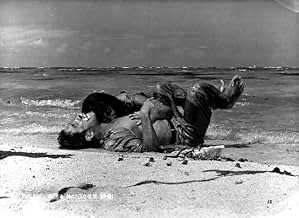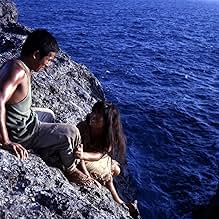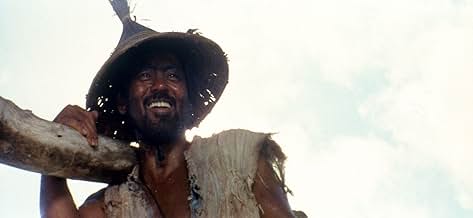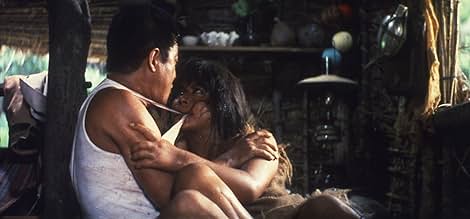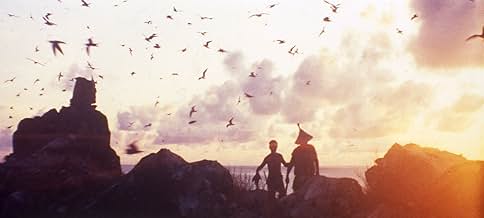Adicionar um enredo no seu idiomaAn engineer from Tokyo arrives on a drought-ridden tropical island to drill a well to power a nearby sugar mill. He meets the inbred Futori family, hated by the locals for breaking religious... Ler tudoAn engineer from Tokyo arrives on a drought-ridden tropical island to drill a well to power a nearby sugar mill. He meets the inbred Futori family, hated by the locals for breaking religious customs.An engineer from Tokyo arrives on a drought-ridden tropical island to drill a well to power a nearby sugar mill. He meets the inbred Futori family, hated by the locals for breaking religious customs.
- Direção
- Roteiristas
- Artistas
- Prêmios
- 5 vitórias e 1 indicação no total
- Direção
- Roteiristas
- Elenco e equipe completos
- Produção, bilheteria e muito mais no IMDbPro
Avaliações em destaque
Things begin to get more interesting when, to his utmost surprise, engineer Kariya is faced with some very primal needs of his own. At the same time, some of the island residents seem ready to put behind their adoration of the gods (sometimes dismissed as 'superstition') in order to concentrate on more practical matters. Others, like the Futori - an incestuous family regarded as beastly even by their neighbors' standards - prove to be particularly resistant to change.
I believe the Japanese director is addressing some of psychiatrist Carl Jung's ideas regarding the unconscious and man's innate need for myth. In his book, 'Man and His Symbols', Jung explains that in prehistoric times, man used to be completely intuitive and animalistic. Through a process of thousands of years, we've become more civilized and scientifically advanced. Yet, the primitive, emotional, non-rational aspect remains perfectly alive in our unconscious and cannot be fully tamed. This interior wilderness manifests itself in different ways, sometimes to our embarrassment, despite our best efforts to control it (a recurring theme in Imamura's films). Because our very existence and such a substantial part of who we are remain such a mystery to us, we use myth and a variety of symbols in an attempt to deal with these powerful, often puzzling, numinous forces within and without.
On a historical note, Imamura was allowed to work with a relatively large budget, but the film proved perhaps too strange and intellectual to please large crowds. This resulted in financial losses and the director vowed to never work with a large studio again.
Surreal and comical (although not outrageously so, like Imamura's last feature film, 'Warm Bridge Under the Red Bridge') 'Profound Desires of the Gods' leaves you with what could be described as a strong sense of psychic intensity.
This movie has a rich and distinctive rhythm, immersing itself in the natural world. Sometimes sort of funny in a messed up way, it also has a very dark core.
I especially liked the humdrum little clerk finding a new part of himself in his relationship with the mentally disabled girl. I don't know if it's an insensitive portrayal but it adds to the movie's rawness.
I've never seen a movie quite like it even if I ultimately watched it in two sittings.
Imamura's view of humanity is a curious blend of pessimism and deep, resonant humor to the extent that they seem to cancel each other out. Perhaps this is why his films are so peculiarly observant, and indeed anthropological. In this respect he's successful both as a "realist" (a notion I'm not fond of in the domain of film but which I use here complimentarily) and a visual poet. In fact, some portions of this film strongly foreshadow Malick's "The Thin Red Line" (1998) in the visual depiction of the narrative role of nature.
All of the Imamuras I know have an image (motif) or a scene that become a kind of hub; definitions of the films and something that stay and live on in the memory. In this film there are many, but two images glow strongest: the pit that Nekichi and the Futoris have been digging for years, as well as the final climax at sea.
On the dedicated forum for this film it has been suggested that there are many parallels between this and Teshigahara's "Suna no onna" (1964). I think that's a connection worth acknowledging and at best it enriches both films.
At this writing this film has received only 475 votes, which is a very small number considering this film has been available on Blu-ray courtesy of the Masters of Cinema series (Region B) for two and a half years.
Director Shohei Imamura personal project film involving an uninhabited somewhat tropical island and it's prehistoric islanders come to fruition once an engineer (Kazuo Kitamura) from Tokyo city attempts to make plans regarding the island as a whole, and transitioning it into a sugar cane factory. Meeting first is the eldest,Yamamori, (Kanjûrô Arashi), appointed as the engineer's protege, is the son, Kametaro (Chôichirô Kawarasaki), appointed priestess of Noro Uma Futori (Yasuko Matsui), an sexually repressed inbred, Turiko (Hideko Okiyama) and the oldest always chained son, Nekichi (Rentarô Mikuni) violated many superstitious rules regarding the islands customs and traditions.
The film's successes are its luscious landscape, evocative production design of heathen and pagan rituals and artifacts, and portrayal of suppressed, taboo desires bursting to the fore. The narrative wanders and explores various tangents that can challenge the attention. This is filmmaking for cinema, and the gorgeous golden beaches and turquoise oceans had me longing to see this on the big screen. A murder by masked men at the end is also visually compelling. This film is interesting in bits, and flashes of genius occasionally show themselves, but the lack of coherence, repetition in the storyline, and outright dud moments (the heavenly vision of the departed patriarch), make this a problematic addition to the Imamura oeuvre. It hints at the great film that this project could have become, a realization of the potential of the vision, rather than the vision itself. Sometimes amazing, sometimes disappointing, this is one to watch and argue over.
Você sabia?
- CuriosidadesOfficial submission of Japan for the 'Best Foreign Language Film' category of the 42nd Academy Awards in 1970.
- Citações
Yamamori Futor: He shouldn't take money. The engineer is a god who came from beyond the sea. It will not do to take money for serving that god.
- ConexõesFeatured in Cinéma, de notre temps: Shohei Imamura, le libre penseur (1995)
Principais escolhas
- How long is Profound Desires of the Gods?Fornecido pela Alexa
Detalhes
- Data de lançamento
- País de origem
- Idioma
- Também conhecido como
- Profound Desires of the Gods
- Locações de filme
- Ishigaki-jima, Ryukyu Islands, Japão(Spelling error)
- Empresa de produção
- Consulte mais créditos da empresa na IMDbPro

